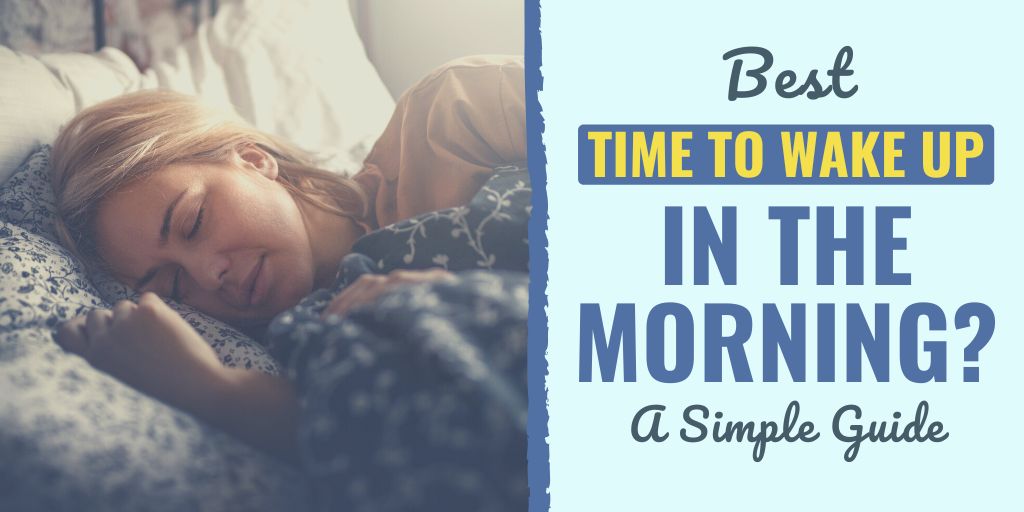There might be affiliate links on this page, which means we get a small commission of anything you buy. As an Amazon Associate we earn from qualifying purchases. Please do your own research before making any online purchase.
Are you able to get up and go in the morning? Or do you press the snooze button several times and eventually go flying into work on two wheels?
I’ve always done things on the early side, so while it’s easy for me to wake up in the morning, I’m usually also the first one to bed. However, I know some people in my family who really struggle during the day when they have to wake up before they’re ready.
The world’s millionaires and billionaires complete a series of habits that start their day on the right foot. The video below talks about the 12 best morning habits you can use to increase your focus, motivation, and energy for the rest of the day.
So what time should you wake up in order to perform your best during the day?
To figure out what the best time to wake up in the morning is for you, you need to determine how much sleep your body needs per night and create a nighttime routine that allows you to get to bed on time.
In this article, we will look at how you can figure out what the best time is for you to wake up in the morning, factoring in your age, sex, and circadian rhythm. Once you can get a routine down, you will find that you have more energy and are able to be more productive throughout the day.
What is the Best Time to Wake Up in the Morning?
When it comes to falling asleep at night, The National Sleep Foundation claims the best time to go to bed is between 8 pm and midnight, however, the best time for you depends on how much sleep you need and what time you wake up.
The truth is, there’s no set sleeping schedule that fits everyone. The best method for developing your schedule is to match your sleep times to your physiological characteristics to get the seven to nine hours of sleep that you need each night.
Consider the following guidelines to get the kind of sleep your body needs.
Circadian Rhythm
Your circadian rhythm is your brain’s internal, 24-hour clock that cycles at regular intervals between being tired and being alert. Also referred to as your “sleep/wake” cycle, your circadian rhythm works in synchrony with the light and dark of the external environment.
When it’s dark outside, your eyes send a signal to your brain that it’s time to sleep. Your brain then tells your body to release melatonin, which makes you feel tired, and your melatonin levels remain high through the night to help you stay asleep.
Alternatively, when you’re exposed to sunlight in the mornings, your brain sends signals to your body to raise its temperature and release cortisol.
Most people experience the biggest decline in energy between 2:00 and 4:00 am, and again between 1:00 and 3:00 pm. If you’re generally caught up on your sleep, you won’t necessarily feel that mid-afternoon crash, but, if you’re sleep-deprived, you will probably notice swings of sleepiness throughout the day.
When you maintain a regular sleep schedule, your circadian rhythm stays on track and you’re able to fall asleep easily and wake up without wanting to hit the snooze button.
However, when things happen that keep you from getting the sleep you need (such as travelling or staying up late to go to a party), you can disturb your sleep/wake cycle, which can have negative consequences on your life, such as:
Hopefully you see the importance of staying on a sleep schedule. Now let’s look at how you can figure out exactly what the best sleep schedule is for you.
Factors that Affect Your Wake Up Time
There are several factors that go into determining the best time for you to wake up.
Age
Research has shown that your circadian rhythm adjusts with age, which means your age can have an impact on the best time to wake up in the morning. The melatonin levels in your blood rise earlier in the night as you get older.
Because of this, people commonly go to sleep at earlier times when they’re older compared to when they’re teenagers, which is the point in life when melatonin levels rise the latest.
Sex
Male and female circadian rhythms are not exactly the same. While a male’s internal clock runs on a complete 24-hour cycle, a female’s cycle is usually six minutes shorter than this, making women feel more tired at night and more likely to wake up earlier than men.
Genetics
Your genetics help determine if you’re a “lark”, a “third-bird”, or an “owl”. People who have the family genes of a lark have a fast internal clock, causing them to prefer to do things early (such as waking up). Larks are morning people, and they get out of bed by 7:00 am.
Third-birds make up the majority of the population. These are the people who, when left with no distractions, naturally wake up between 8:00 and 10:00 am.
Finally, those with the family genes of an owl have a slow clock and prefer to do things late, which means they work better if they sleep later in the morning and get their work done at night. On days that owls don’t have to get up and go to work, they don’t get out of bed before 10:00 am.
What's Your Chronotype?
The difference in these types of circadian rhythms (which are called your chronotype) can create some challenges for people, especially if your daily schedule and your circadian rhythm don’t match up.
A lark who has to work late at night or an owl who has to be at the top of their game first thing in the morning will both have trouble because of the chronotype mismatch.
Such people face low energy and inattention because they have to struggle to stay awake, even if they’re passionate about the task at hand. When you work against your internal clock, you will feel a permanent sense of jet-lag.
However, if you’re able to work in sync with it, you will have more energy during the day and you will be able to perform at a higher level.
Your chronotype can determine your peak performance time–when you’re working at the top of your cognitive performance and executive functioning. It can also tell you when you can expect to be sleepy.
Trying to complete tasks during your ‘biological nighttime’ can be damaging to your performance. Consider the impact this could have on professionals who could make life-threatening mistakes if their alertness is compromised, such as pilots and surgeons.
Usually, owls experience a chronic misalignment due to having to follow an earlier schedule throughout the work week and then going back to a later sleeping schedule on the weekends.
This may help explain your struggle if you have found it to be difficult to function on a normal 9-5 schedule, as studies have shown that the cognitive performance of owls is significantly impaired when they have to perform simple or complex tasks in the morning.

How Do You Know What Your Chronotype Is?
Your chronotype is determined by the length of your PER3 gene, which can vary depending on different factors, including your genetics, environment, and age.
Your chronotype influences your hormones, metabolism, and body temperature, among other things. While your chronotype can change with age, there is nothing you can do to change your chronotype on purpose.
To find out what time you should wake up in the morning, you have to figure out what your chronotype is. There are several tests that are offered by doctors that can help shed light on this, including the Morning-Eveningness Questionnaire and the Munich Chronotype Questionnaire.
While you can’t change your chronotype, understanding what yours is can help you improve your sleep quality and your productivity because it can help you set an ideal sleep schedule. Knowing your chronotype will also help you plan your day to optimize your productive time.
While larks and third-birds experience a peak in energy at the beginning of the day, followed by a trough and then a recovery, owls experience their days in reverse, starting with a recovery and then moving to a trough, and finally a peak.
This means if you're an owl, you are able to focus the most (and best complete analytical tasks) in the evening.
Experiment with small variations in your sleep schedule to see what works best for you. If you end up waking up before your alarm goes off, try going to sleep later. Or, if you’re having a hard time staying awake until your set bedtime, shift it up a bit.
When you figure out a schedule that works best for your body, you will find that you don’t need to use an alarm clock in the morning to get up. Your body will naturally wake up on its own.
You can also use an app, such as Sleep as Android to figure out your chronotype and learn more about your personal sleeping patterns. Sleep Cycle is another app that can help you wake up at a time that is ideal for your internal schedule.
Once you figure out what sleep schedule works best for you, keep those times consistent throughout the week and the weekend. Doing so will help you fall asleep and stay asleep each night and give your mind and body the rest that they need for you to function at your best.
Final Thoughts on the Best Time to Wake Up in the Morning
In this article, we talked about the importance of knowing your chronotype to help you figure out when is the best time for you to wake up so you can work around the times of day when your executive functioning is at its best.
Once you get on a schedule, create some morning routine habits to keep your mornings consistent. If you need some help creating a routine, there are some morning routine apps that offer helpful ideas. No matter what time you get up, having a daily morning routine can greatly enhance your day.
Now, if you have kids and want to teach them good sleep and morning habits, these articles might help:
- 6 Steps to Create a Morning Routine for Your Kids (with Templates)
- 16 Morning Routine Charts to Print and Track Your Habits
- 15 SMART Goals Examples for Kids
Finally, if you want the perfect morning routine, then check out this seven-step process for creating a morning routine that will become a vital part of your daily life.)

Connie Mathers is a professional editor and freelance writer. She holds a Bachelor's Degree in Marketing and a Master’s Degree in Social Work. When she is not writing, Connie is either spending time with her daughter and two dogs, running, or working at her full-time job as a social worker in Richmond, VA.


